Kellie Curtain Let's be Upfront about metastatic breast cancer. When someone is diagnosed as having metastatic breast cancer which is also referred to as stage 4 breast cancer it means that the disease has spread from the breast to another part of the body. This might happen months after being diagnosed or many years later metastatic breast cancer is not curable. But there are many treatments that can help control it. If one treatment stops working there's usually another that can be tried. In this edition of Upfront we're going to address some of the many questions that come up when you're told you have metastatic breast cancer and also empower you to speak up when it comes to your treatment and care. To do that we welcome oncologist and BCNA board member Professor Fran Boyle.
Fran Boyle Good morning.
Kellie Curtain Also joining us is Georgie Fyfe-Jamieson who was diagnosed with early breast cancer in 2009 and then metastatic breast cancer in 2017 at the age of 42. Welcome to you both. So Fran I think it's important to probably start by saying everybody's story is different. As an oncologist How do you decide what treatment is best?
Fran Boyle There are a lot of factors that go into the decision about what treatment is best. And a lot of that comes fortunately from research so in breast cancer we're fortunate that there are a number of different kinds of breast cancer that have different targets for drug treatment. And we can talk about that more in a minute. And also there's been a lot of clinical trials done in the past. We're fortunate, you do you have a lot of drugs. And the aim is to try and choose the most appropriate thing for that patient not just what their cancer is doing but also what their life is doing. What are their needs what are their symptoms what are their travel plans. All of those things will come into it. So for that reason you may find that you're taking quite a different pathway through a treatment compared to somebody else.
Kellie Curtain Georgie you were initially diagnosed with early breast cancer and then it spread. Take us through that moment when you discovered that it had spread to another part of your body.
Georgie Fyfe-Jamieson Well I was about 32 when I was diagnosed with early breast cancer. So because I was young I did always have that niggling feeling after my treatment that it would probably return at some point in my life. But when I was 41 I wasn't ready for that diagnosis. But once I'd gone to the doctor with my symptoms and it was confirmed really quickly I was shocked. But I felt very much looked after and a treatment plan was developed very quickly for me. So um it was difficult to manage initially but uh but I'm doing okay.
Kellie Curtain Fran from a medical point of view that must be quite a common reaction is shock and fear.
Fran Boyle I think that first six months and particularly the first few months are really a very difficult time for most people. And after that hopefully things settle down a little bit. Usually the disease can come under control with treatment. Patient starts to feel better if they've got back pain or in pain that starts to improve and they get back to some of their more normal activities. And that first sort of panic settles down after that. Yes you're likely to need to change treatment at some stage but usually we're a little bit ahead of the game by then. We're doing scans on a regular basis perhaps during regular blood tests and when the cancer starts to change or move to another part of the body we're not so far behind and we can change treatment or move to that next step in the pathway before you get sick. And that's the aim of the game is just sort of even out those bumps of time when you feel unwell and by moving treatment as soon as you see a change in what the cancer is doing.
Kellie Curtain What is some of the experiences you had with the course of your treatment since being diagnosed with metastatic?.
Georgie Fyfe-Jamieson Yeah. I mean the initial shock was was difficult. And as Fran said it was definitely the first six months probably that were really hard and really the uncertainty trying to manage the uncertainty of how it was going to roll out. And given that really it's incurable but being told that there are several lines of treatment available but not really knowing how long each one is going to last for. How many there are and how they're going to impact you kind of on a day to day basis as well. So really for me the uncertainty of all of this was really hard because I like to plan to kind of know what's happening. Um but I was given a lot of assurance or reassurance by the oncologist and um nurses as well. Um most of the time.
Kellie Curtain What is some of the things that you did to try and deal with that uncertainty?
Georgie Fyfe-Jamieson Um I did try to. Well it took me a while to come round to not looking such uh so far ahead. So uh kind of managing things on a shorter term basis but I started to prioritize what was important in my life and um kind of look at my work options as well um just just to try and make things manageable. Um I do a lot of exercise and when I was able to um. That really helped with my physical and mental well-being as well.
Kellie Curtain What is some of the side effects of your treatment. Have there been any?
Georgie Fyfe-Jamieson I've been pretty fortunate. Um so far I had a bit of tiredness on my first treatment. Um the third line that I'm on now um as well I've uh experienced more tiredness and some nausea and loss of appetite. But um that's kind of a bit more under control now. I feel like I've been pretty fortunate so far in the three treatments that I've had. Um in terms of side effects.
Kellie Curtain Fran with choosing treatments is it a real balancing act. How do you balance the medical benefits versus the possible side effects and quality of life.
Fran Boyle I think we have a lot of research in metastatic breast cancer now that shows that the best quality of life usually come when the cancer is under control. And it's actually cancer progression that makes people feel unwell primarily and I think Georgie what you've described is nausea loss of appetite fatigue. Those are actually quite common symptoms of cancer not just of cancer treatment. So usually once the treatment starts to work people start to feel better and so the most important thing is to have a treatment that's working that is in a dose that's appropriate for that individual. And that might take a little bit of time to work out. Yes there are recipes and there are recipe books that say start with this dose. But that's not going to be right for everybody. So there is a little bit of an art form in just adjusting the dose over that first few months to make sure blood tests are in the right place. It's doing what you want to do and it's not causing too many side effects. So there's actually no benefit in having extra side effects just for the sake of it because quality of life is going to be that balance of side effects of treatment. And most importantly control of disease. In the time that I've worked with patients with metastatic breast cancer we've been through a couple of different eras and the first one was where I started my treatment of some other kinds of cancer. People tested building up a huge pile of chemotherapy and giving it all in one big splash to see if you could eradicate the cancer. So so-called high dose chemotherapy that was so toxic that you had to give a bone marrow transplant to actually help patients recover. And sure there were some people who did well. But there were also people who died as a consequence of the treatment. And in the end clinical trials showed that it was no better for overall survival and was so much more toxic.
Kellie Curtain And that must be really tempting for people when they're diagnosed with any sort of cancer let alone metastatic. I imagine your immediate reaction would be like throw everything at it. Let's just give it everything we've got. I'd rather feel unwell for a short amount of time and hope that it has maximum impact.
Fran Boyle That's exactly right. And people are often asking the question "I don't feel sick enough with this stuff. You're giving me is it really working?" Because you know early breast cancer we do tend to give fairly high doses and really push things quite hard. Now looking back at that era it's possible that some of those breast cancers that respond really well to chemotherapy like triple negative. We can perhaps revisit that era but we know so much more about breast cancer biology now that we know of hormonal breast cancer that would be a super dumb idea just was never gonna work. But they didn't buy that back then. After that era we then all recoiled from that and started to stretch our treatments out as long as possible. So I call that the limbo era where you know how low can you go only give one treatment at a time and stretch them out as long as possible and for some kinds of breast cancer that was a pretty good idea. What we're now tending to do is combine treatments where it's possible. And so are those sort of dual era where you have hormone blocking treatment and something that Georgie's had which is ribociclib most likely with that often has a better effect than just a hormone blocking treatment by itself. And so now we're often pairing up treatments that work in different ways to try and get a better benefit. I think we're going to see that survival improves with that third strategy without too much extra side effect burden.
Kellie Curtain You mentioned before that quite often that what might be a side effect could also be a progression. How do you manage fear of progression which would be very real vs. what could actually be the reality of progression.
Fran Boyle I think when we're following patients very closely during their treatment that's often every three or four weeks. So things don't really have a chance to get completely out of hand in that situation. I mean that's really unlikely that you're going to suddenly die without there being some warning of that. So you probably take that off the table fairly safely. The other thing is that when your oncologist is recommending that you have a scan what you can do is ask them what are you expecting it to show. So that you've got some idea ahead of time about what the possible treatment choices might be. It's also a good idea to have scans as close as possible to your appointment so that they're not going to leave you waiting four days for the result. And on the other extreme if you have them too close and there isn't a report that's annoying as well because you're held up with uncertainty as Georgie mentioned often one of the worst things to deal with. So a day or so before is usually quite good. Making sure your scans are being done where your oncologist wants them and where they can rapidly get access to someone to check them if there's a question and reducing the amount of uncertainty that you carry I think is pretty important. Otherwise it does your head in a bit.
Georgie Fyfe-Jamieson Yeah that's right. And I think you know oncologists. Well my oncologist tends to be good about uh kind of suggesting what might be next. And I feel as a patient that's really important to have a bit of an indication because yeah that uncertainty is kind of always present. So I know this. Uh yeah. For example I was on a clinical trial for my second line of treatment and they were monitoring me through regular scans and tumour marker levels as well. So I was being kept in the picture with all of that but it's always a really nerve wracking time waiting for your scan results. Definitely because fear progression is very real.
Kellie Curtain The tumour markers become the holy grail a little bit.
Fran Boyle Oh they can and I do have patients who've got husbands who are engineers who turn up with the excel spreadsheet with the tumour markers plotted on them and every minor variation causes panic. And not everybody has tumour markers and they are also probably more reliable early on in the disease than they are late. So if you've had breast cancer for a long time your tumour markers may not monitor the disease as clearly as they did in the beginning and that's because as the breast cancer goes along there may be new changes or mutations in some of those little sets of cells that stop them making the tumour marker. And so that's where being examined, being listened to really importantly and also having scans is important as well. So tumour markers by themselves are really not the answer.
Kellie Curtain Have you engaged in any mental therapy so to speak that has helped you with your progression or with uncertainty?
Georgie Fyfe-Jamieson Yeah I have actually. I've really benefited from some sort of psychological support at the hospital that I'm being treated at. That was offered to me. So I've had a few psychology sessions one on ones which have been really useful to be able to talk about. Yeah. For example the uncertainty of the form and the progression and because that has has happened so that's been really useful. The other thing I do is I go to a peer support group so women who are in a similar situation to me with metastatic breast cancer meet up every two or four weeks sometimes there's a presentation by a professional medical professional. Other times it's just a sort of social gathering. And it's really useful because we're all in a similar boat. We have a really good laugh which is really nice but obviously there are many times when we talk about some of the serious issues that are factors on a day to day basis. So it's uh yeah been really helpful to access that. I feel fortunate living in a city where there are kind of services like that available BCNA Online Network is a wealth of information where people can really ask questions that maybe they're not confident to ask for. Yeah I have access to that as well and that's been really helpful in my journey to get um is brilliant too. And early on I got a copy of the Hope and Hurdles resource which is brilliant.
Kellie Curtain We drew it out online. We have an online tool so that you can access that sort of information at any time. Yeah. When you were diagnosed did you make any. Changes to life.
Georgie Fyfe-Jamieson I didn't. Um although I wanted to panic and make major changes. I had assurance from my oncologist and family and friends that nothing was going to happen majorly quickly. So um probably 10 to 12 months into their diagnosis. It's now been nearly two years. I did make a big decision to stop working. I sold my small business and I've had a few months off work and in that time I've had some extraordinary experiences I've been able to travel because I'm on tablet treatment. Um I've been able to spend more time with family and friends and really importantly to me I've had the opportunity and the time to do a lot more physical exercise which has done me so much good and kind of physical and mental ways. So those were quite big changes obviously giving up work is a really big thing I am in a fortunate position to be able to do that for now. So that was probably the biggest change that I made. You know I realize more than ever now that kind of life is important. You've only got one life and I try and make the most of it.
Kellie Curtain Fran could you take us through the first second and third line treatment. So to try and clarify that for people once they're diagnosed.
Fran Boyle For most of the types of mind a static breast cancer for instance hormonal metastatic breast cancer or HER 2 positive metastatic breast cancer there are very well-established treatments that people would ordinarily be offered first and you would only switch to a different treatment if the cancer started to progress or you weren't tolerating the first one.
Kellie Curtain And I take it that that's different for everybody so it might last for six months for one person and longer for another or shorter.
Fran Boyle Well oncologists can usually give you an idea based on the clinical trials of what the average amount of time that people stayed on that first line of treatment was. So for instance with her septum and chemotherapy and he's a man added in it might be two years as the average amount of time. That's not dissimilar to ride by cycling. And end result for instance maybe about two years would be average. The first two or three months is the real waiting game where you wait to see whether it's kicking in and if it's not quickly onto something else. And there will be people who will still be on treatment of 10 years. Now we haven't quite got there yet because we haven't had those drugs for 10 years. But I'm very confident they'll be people who get a very good run and have very sensitive disease. So far we're not so good at picking out who those people are going to be. I wish we were but most people will need to shift to something else and that's where the monitoring comes in. Now for people with triple negative breast cancer. There are a range of different choices for the first line treatment and there are often a lot of clinical trials open for them as a first line choice. So that's a good time if you've got triple negative breast cancer that spread to ask the question Is there a clinical trial for me. Because they often come up first. For people with the other kinds of breast cancer those clinical trials are much more likely to be in the second line setting which is similar to what Georgie's experienced. So you can comfortably jump on to whatever needs to be done first but as time goes by I start looking around for what your second step might be and clinical trials open and close. They collect their patients they percolate their results and it takes time. So it's something that's open now may not be open in 12 months time. So I don't want to think too far ahead but it's good to let your oncologist know if you're interested in clinical trials so that they can keep an eye out for you. That might mean moving to another institution you might not have treatment in the same place that you did originally. So for some people that's a significant challenge but it's worth putting out those feelers and making sure that you're not missing out if there are opportunities to be involved in research
Kellie Curtain It is often difficult for people to speak up when they're with health professionals for fear of either sounding silly or just there's so much information to take in. What advice would you give to patients?
Fran Boyle Well I love it when people ask questions and often when they come into my office they go oh are you gonna go first or am I gonna go first? And usually I'm happy for them to go first to be honest as long as they're not clutching their chests or staggering about and so preparing for appointments with a list of questions is a really good idea. Making sure you always bring with you a list of your medications what you're taking in an up to date way what doses you're taking. That's really helpful because you may be getting drugs from a bunch of different people including your GP and your oncologist really needs to know exactly what you're on. Actually asking the question of your professional "if this doesn't work as well as we hope, what do you think I might do next? What are the options?" Helps to avoid that sense that if you come in on the scan isn't good you're going to drop off the waterfall in any minute. And also sometimes asking "Is there anyone that you know of that will be good for me just as a second opinion who might have access to clinical trials or to some other thoughts?". Because sometimes just chewing things over with a different oncologist second opinion consultations usually people set aside an hour for those so there's more time and it's a bit more of a chance to have a strategic discussion rather than you know, your blood test is fine, tick your scan's fine, tick, you're feeling okay, tick. Out the door into the crowded waiting room. So that often can help people just to get a bigger picture sense of how they're doing.
Kellie Curtain Do oncologists take offence if you ask for a second opinion?
Fran Boyle I suspect some might. I actually do a lot of second opinion consulting because I think it's fun and I meet some amazing people in that process. You've got to have the time to do it. And people who need a first opinion will always be prioritized. So you're not going to find a super busy oncologist willingly giving up that hour if there's a new patient who needs to be fitted in first. So it's not going to happen overnight.
Georgie Fyfe-Jamieson Would you. The patient goes to another hospital for a second opinion?
Fran Boyle Depends a little bit on what the reason is you're asking for a second opinion. So if you're looking for a particular clinical trial it's often good to get your oncologist to search where that trial is open and make sure that you're going to someone who's involved in that study. And there are lots of resources, apps and websites and so forth where oncologists can do that. So if it's a very directed question it's usually good to get them to help you. If it's more like this organisation's not working for me. This relationship is not working for me. This communication is not working for me. I'm frightened. That's probably better on a chat with a support group that can work pretty well and find out maybe whether there's an institution or an oncologist with a different style. Or ask your GP for advice because they'll have had people who've been looked after by different oncologists and that might have a better chance to match up personalities with people because it's a really important long term relationship, the one you have with your oncologist. It's got to work and it's got to work both ways. I've got to be able to trust you. You've got to be able to trust them. And so sometimes it takes a while to find that right person. Don't bond to me.
Kellie Curtain So we were joking before that uh oncologists don't have a crystal ball to be able to tell you what's ahead. But in actual fact Fran, you tell me that you do you!
Fran Boyle I do have a crystal ball on my desk in my office and it's useful for those times when patients tend to you and say "now, I know you don't have a crystal ball but..." And of course it's helpful to say "oh here it is. What would you like to know?" Because I think the crystal ball question is one that reveals what's most important to that person and what they're worried about what their concerns for the future are. And when someone says that to me I always think it's so hard to ask those questions. You are so vulnerable when you do, that being respectful and trying very hard to answer those questions is really important. So for one person it might be like Georgie what do I do with my business? Is it better for me not to be working and so stressed and be looking after myself better because I'm not going to live forever? For another person it might be can I travel? If I was dying would you let me know so that I could go home to my family? If I was running out of treatment options would you give me a warning? Can I live to see my daughter have her baby? So those questions are just so deep and important and so personal that it's really good to get them out there because your oncologist usually can help you get some idea of what those things are achievable or not.
Georgie Fyfe-Jamieson And until the patient asks those questions maybe the oncologist doesn't know that you know how important that is to you. So it is important to speak up and and work out what's important to you.
Kellie Curtain And you can relate to what Fran was just saying?
Georgie Fyfe-Jamieson Very much so. Those kinds of questions I had from really early on and some come later on down the track as well so I think building up a relationship with your oncologist and and being able to ask those questions and having the confidence to do so and feeling like you're going to get some sort of an answer is really really helpful.
Fran Boyle We do actually train oncologists in communication skills which might surprise you but they in fact are probably the best trained health professionals in the country because it's recognised that's a tough job and you don't want your oncology team burning out because of the emotional stresses of the job. So we do train oncologists to talk about prognosis and what we teach them is that you can usually tell people on average something about what's typical and that's based on clinical trial results. If all the steps of treatment for held what would be the worst case scenario? And you can also give patients a clue about what would be the best case scenario. So best case scenario Georgie runs out of money because she lives way too long and we have 25 new drugs by then. And so she just steps pleasantly from one to the next and when she's an old woman she's regretful that she gave up her cycling business. So that would be a nice problem to have and there will be patients that will work out that way. But it's really important to know what's typical because that gives you a better ability to plan.
Kellie Curtain And just finally with more and more medications coming onto the market with more research metastatic breast cancer doesn't necessarily mean doom and gloom straight off does it. It's getting better and people are living long and well for for many years.
Fran Boyle That is the case and I think your expectation in Australia should be that the care you receive here is really world class thanks to the work of BCNA and your oncologists and your researchers. We do have access to a better selection of drugs than most other places in the world. And you shouldn't feel that you know being dead in 10 minutes is what's going to happen when you're first diagnosed. Having said that everybody rallies around when you first diagnose because it is scary and sometimes they get bored because you live too long. And so having people understand that you still are living with a concerning medical condition that you have to exert quite a lot of vigilance and really look after yourself makes it much more like living with a chronic illness or chronic pain which I've got experience with and people do get bored with that. So I'm making sure that you're letting people know when you need help and just because you look well doesn't necessarily mean things are okay under the surface.
Kellie Curtain The final word to you Georgie.
Georgie Fyfe-Jamieson Yeah I mean I've been really fortunate in the sort of twenty one months that I've had treatment that I haven't experienced too many side effects so I've been able to live really quite a normal life otherwise. And as I say being able to do exercise and see family and friends and travel has been really beneficial. So I'm very well looked after and have a lot of support around me. And I have a lot of hope. There are some incredible treatments out there I was on a clinical trial for seven months which I look at as a kind of real bonus because it's an extra one to the standard line treatments that are available. So I was really happy to be on that. I was really well looked after I had a nurse that I could ask questions to at any time as well. And I've been told that there are other lines of treatment available. So I'm feeling optimistic and I feel like the people I know with metastatic breast cancer mostly feel like they're really well looked after and good treatments available. Wonderful.
Kellie Curtain Thank you to you Fran and Georgie for joining us on Upfront. A proud production of Breast Cancer Network Australia with thanks to Cancer Australia. If you want to know more about metastatic breast cancer there are links to resources on our website BCNA.org.au. This podcast series is intended to provide information suggestions and upfront discussion about all things breast cancer. Please contact your health professional with any concerns you might have. The opinions of our guests are welcome but not necessarily shared by BCNA. And we'd love to know your thoughts too by leaving us a message on our feedback page. I'm Kellie Curtin. Thanks for being upfront with us.


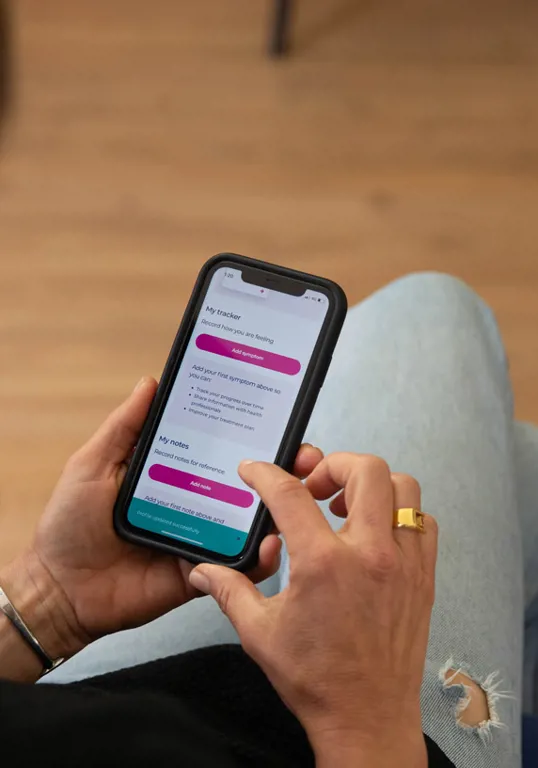




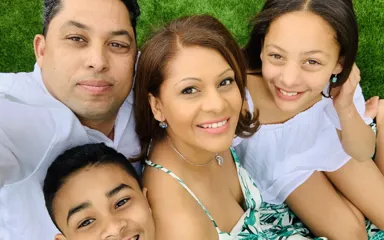
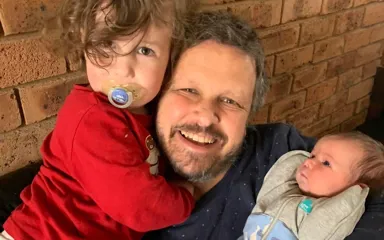
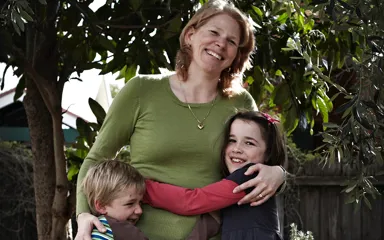
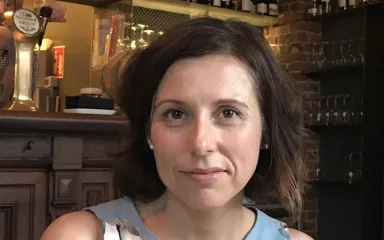
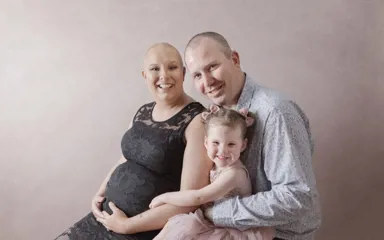
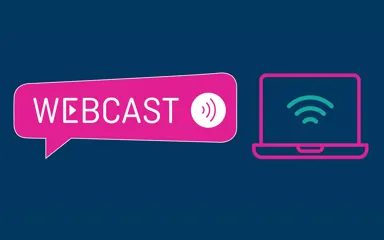







Listen on